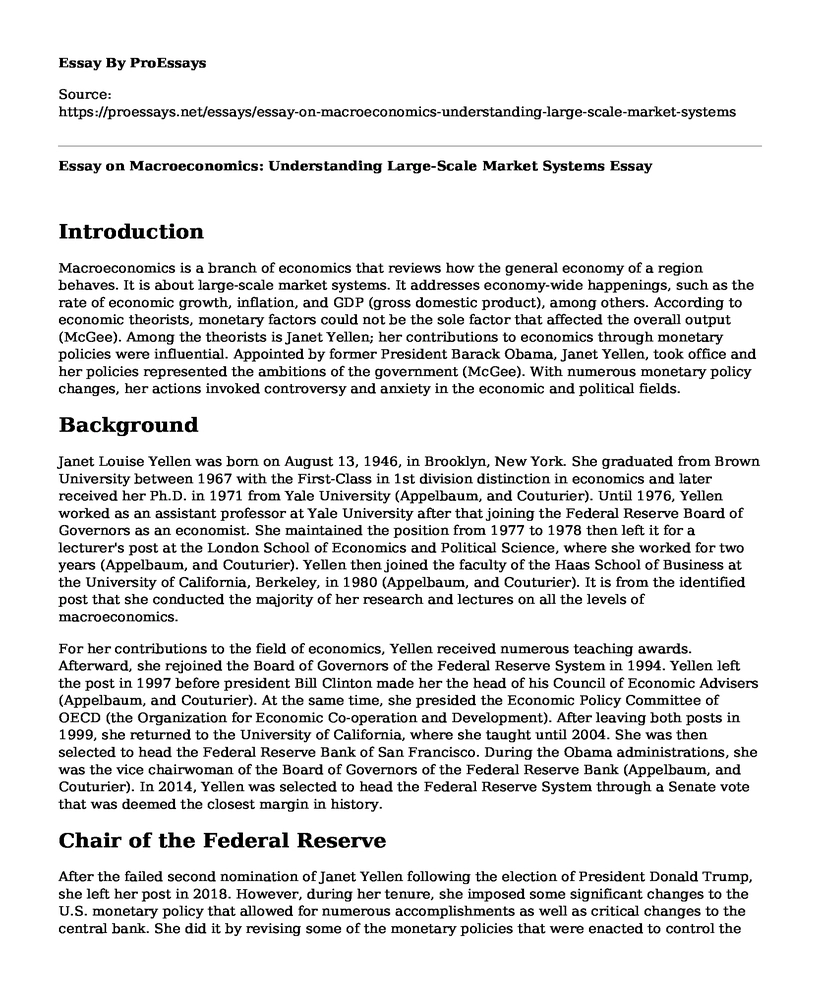Introduction
Macroeconomics is a branch of economics that reviews how the general economy of a region behaves. It is about large-scale market systems. It addresses economy-wide happenings, such as the rate of economic growth, inflation, and GDP (gross domestic product), among others. According to economic theorists, monetary factors could not be the sole factor that affected the overall output (McGee). Among the theorists is Janet Yellen; her contributions to economics through monetary policies were influential. Appointed by former President Barack Obama, Janet Yellen, took office and her policies represented the ambitions of the government (McGee). With numerous monetary policy changes, her actions invoked controversy and anxiety in the economic and political fields.
Background
Janet Louise Yellen was born on August 13, 1946, in Brooklyn, New York. She graduated from Brown University between 1967 with the First-Class in 1st division distinction in economics and later received her Ph.D. in 1971 from Yale University (Appelbaum, and Couturier). Until 1976, Yellen worked as an assistant professor at Yale University after that joining the Federal Reserve Board of Governors as an economist. She maintained the position from 1977 to 1978 then left it for a lecturer's post at the London School of Economics and Political Science, where she worked for two years (Appelbaum, and Couturier). Yellen then joined the faculty of the Haas School of Business at the University of California, Berkeley, in 1980 (Appelbaum, and Couturier). It is from the identified post that she conducted the majority of her research and lectures on all the levels of macroeconomics.
For her contributions to the field of economics, Yellen received numerous teaching awards. Afterward, she rejoined the Board of Governors of the Federal Reserve System in 1994. Yellen left the post in 1997 before president Bill Clinton made her the head of his Council of Economic Advisers (Appelbaum, and Couturier). At the same time, she presided the Economic Policy Committee of OECD (the Organization for Economic Co-operation and Development). After leaving both posts in 1999, she returned to the University of California, where she taught until 2004. She was then selected to head the Federal Reserve Bank of San Francisco. During the Obama administrations, she was the vice chairwoman of the Board of Governors of the Federal Reserve Bank (Appelbaum, and Couturier). In 2014, Yellen was selected to head the Federal Reserve System through a Senate vote that was deemed the closest margin in history.
Chair of the Federal Reserve
After the failed second nomination of Janet Yellen following the election of President Donald Trump, she left her post in 2018. However, during her tenure, she imposed some significant changes to the U.S. monetary policy that allowed for numerous accomplishments as well as critical changes to the central bank. She did it by revising some of the monetary policies that were enacted to control the effects of the 2008 financial recession (Breuss). Among the most noticeable deeds was her supervision of the program that saw the selling of Treasury and mortgage bonds. They were bought by the government to stimulate the economy; by selling them, she directly increased the government's reserves thereby resulting in the lowering of federal interest rates (McGee). Her actions of reviewing the previously imposed policies promoted the growth of the economy positively affecting the unemployment rate as well as national income for both public and private employees (Chetty). Before she departed from the public office, she claimed that with the current Federal Reserve oversight, the financial system is more robust (Breuss). Therefore, the likelihood of another economic crisis is unlikely; this notion has, however, been challenged by various economists and politicians.
Works Cited
Appelbaum, Binyamin, and Kelly Couturier. "Yellen'S Path To The Pinnacle". Archive.Nytimes.Com, 2017, https://archive.nytimes.com/www.nytimes.com/interactive/business/yellen-timeline.html.
Breuss, Fritz. "The Crisis Management Of The ECB". Financial And Monetary Policy Studies, 2016, pp. 199-221. Springer International Publishing, doi:10.1007/978-3-319-45710-9_13. Accessed 2 May 2020.
Chetty, Raj. "Improving Opportunities For Economic Mobility: New Evidence And Policy Lessons". Stlouisfed.Org, 2016, https://www.stlouisfed.org/publications/bridges/fall-2016/improving-opportunities-for-economic-mobility.
McGee, Suzanne. "The Fed Has Spoken. Now You Need To Look At Your Interest Rate Policy Too". The Guardian, 2015, https://www.theguardian.com/business/2015/dec/20/federal-reserve-interest-rate-hike-affect-my-policy.
Cite this page
Essay on Macroeconomics: Understanding Large-Scale Market Systems. (2023, Jul 02). Retrieved from https://proessays.net/essays/essay-on-macroeconomics-understanding-large-scale-market-systems
If you are the original author of this essay and no longer wish to have it published on the ProEssays website, please click below to request its removal:
- Research Paper on Age Discrimination in Employment
- Financial Benefits and Corporate Social Responsibility on Job Engaged for an International Employee Working in Taiwan
- Thomas Piketty's Account in Capital in the 21st Century Paper Example
- Essay Example on Japan and Globalization: Social Change and Impact
- Essay Example on Current US GDP & Federal Debt: 85.91 Trillion & ~23.17 Trillion Respectively
- Paper Sample on Market Basket Employees & Customers Unite to Protest CEO Firing
- Essay Sample on International Activities: Essential for Firm Monopoly Advantage







